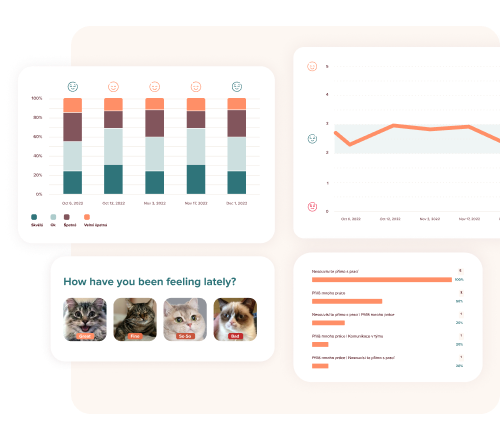Building a supportive workplace:
A comprehensive HR guide on mental health conversations
Ever found yourself observing signs of concern in your team members but unsure of the best way to address it? While mental wellbeing may seem like a private matter, navigating the high-speed and stress-laden environment of today’s workplace makes it crucial for HR managers to adeptly broach conversations about it.
This blog post aims to guide HR professionals on effectively discussing mental wellbeing with employees and providing assistance in a compassionate manner. Discover insights on approaching these situations and empowering your team to prioritize their mental health.
Mental distress may not only affect the atmosphere in the company, but also negatively affects work performance. Whether your colleagues face mental difficulties, are going through something, they find it hard to concentrate or lose motivation to work, their productivity might drop.
However, the reality is that not every employee feels comfortable opening up about their personal life. This raises important questions for HR managers, such as how to encourage open discussions about mental health, initiate conversations on the topic, and provide effective support for employees facing mental health issues. Surmounting the barriers associated with mental health can pose a challenge, but there are strategies to assist your employees and extend a supportive hand.
Foster open communication
Establishing a supportive environment begins with creating a safe space where employees feel free to discuss whatever is on their mind – from work struggles, feedback towards the company to asking for help if needed. Building trust is crucial in cultivating this atmosphere, achieved through open and honest conversations that demonstrate your support and respect for their well-being.
Emphasize the confidentiality of these discussions, assuring employees that shared information will remain private. Acknowledge each employee as an individual, not just part of the workforce, and encourage a culture where mental health is openly addressed. By taking these steps, you contribute to positive changes in both the workplace and personal lives, becoming a source of support and inspiration for your team’s mental well-being.
Observe changes in behaviour
Observe your employees behaviour with empathy, whether they are showing subtle changes in their manner or more pronounced signals. You may notice increased stress levels, a drop in their usual productivity or even mood swings. These moments may be the first signs that an employee is going through a difficult time in their personal life or at work. Awareness of these changes is the first step to providing support and understanding. These are not always clearly visible signs, but attention to detail can help reveal the need for support or professional help.
Hedepy’s mood tracking feature serves as a valuable tool for HR professionals in gaining insights into an employee’s well-being. By allowing employees to log and track their moods, Hedepy provides a comprehensive overview of emotional states over time.
This data not only facilitates self-awareness but also offers HR a nuanced understanding of individual and collective mood trends. Sudden or prolonged shifts in mood patterns can serve as important indicators, prompting HR to initiate supportive conversations or interventions when needed.

Choose a private and comfortable setting
Now that you’re at the stage of starting a conversation about their struggles, it’s important to choose a setting that is not only private, but also comfortable and confidential. Be aware that many employees may find opening up and sharing their feelings difficult and scary. Therefore, creating an environment where they feel relaxed and safe is key.
Try to find a space where you can talk without any distractions. This can be a quiet room away from the main work area, or even a café, if you think your employee will feel more comfortable outside of the office environment. It’s also important to set aside plenty of time for the conversation, as ending a productive dialogue prematurely can be discouraging for employees.
When starting the conversation, remember the importance of a friendly and reassuring atmosphere. A small gesture like offering a cup of coffee or tea can create a pleasant atmosphere and help ease tension.

Use compassionate language
When talking about psychological support with your employee, it is crucial that you approach them with the utmost empathy and sensitivity. The words you use can have a huge impact on how your employee feels during the conversation and their willingness to receive support. Try to use words that convey your support and concern. Focus on expressing that you noticed changes in their behavior and emphasize that you are there to help them.
You can start by saying something like, ”I’ve noticed that you’ve been going through some changes lately, and I’d like to offer my support’‘ This phrase conveys your attention to their situation and your willingness to help them without judging them or overloading them with more questions. It is also important to avoid making assumptions about what might be causing their behavior. Instead, focus on giving them the space to express themselves and share their feelings.
Focus on well-being
Focus on the overall well-being of the employee, rather than on the specific problems. Try to show an interest in how your employee is feeling and how their mental health manifests itself in their day-to-day life. You can start by saying something like, ”I’m interested in how you’re doing and how your mental well-being affects your day and your work.
Offer available resources
When you get to the point, where you are discussing employees’ concerns and feelings with them, it is important to provide them with information regarding available mental health resources and services. This may include information about mental health care programs or any external resources that may be available both inside and outside of your company.
This way, you can show your support and concern for their well-being. At the same time, you can emphasize that seeking professional help does not have to be difficult and you are prepared to help them with getting the help they need.
One of the resources you may offer is Hedepy, which provides tailored psychological support for teams worldwide. Hedepy offers a compassionate and accessible support system for employees navigating personal challenges. Through therapy and a curated selection of resources, employees can access tailored content designed to address various aspects of well-being. Whether it’s stress, anxiety, or other personal concerns, Hedepy provides a confidential and convenient platform for individuals to explore content at their own pace. Would you like to know more about our tailored support?
Try Hedepy with no strings attached
-
Get Hedepy without commitment
-
We prepare a webinar for you to support psychological resilience
-
Your team will have access to online lessons


